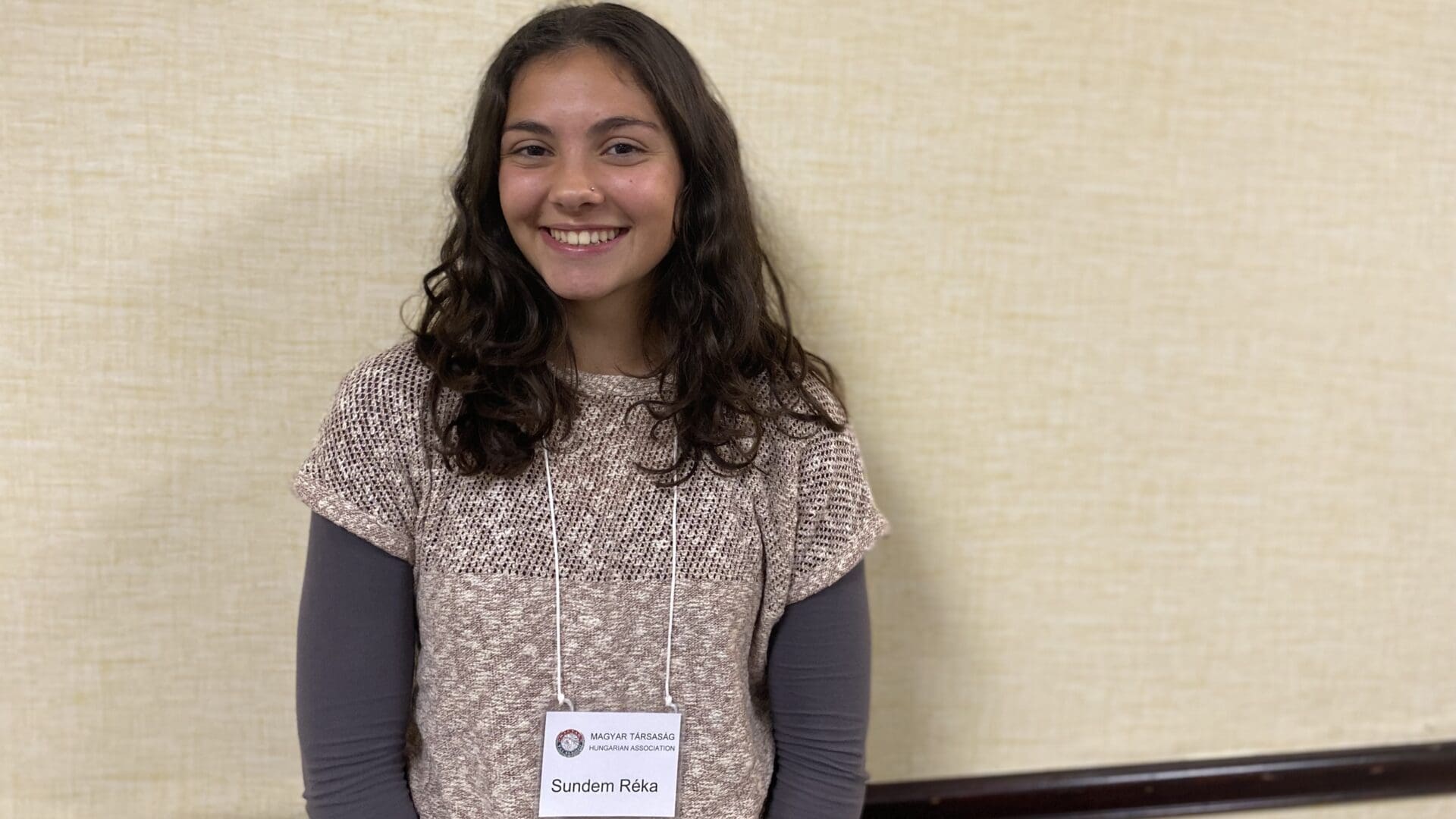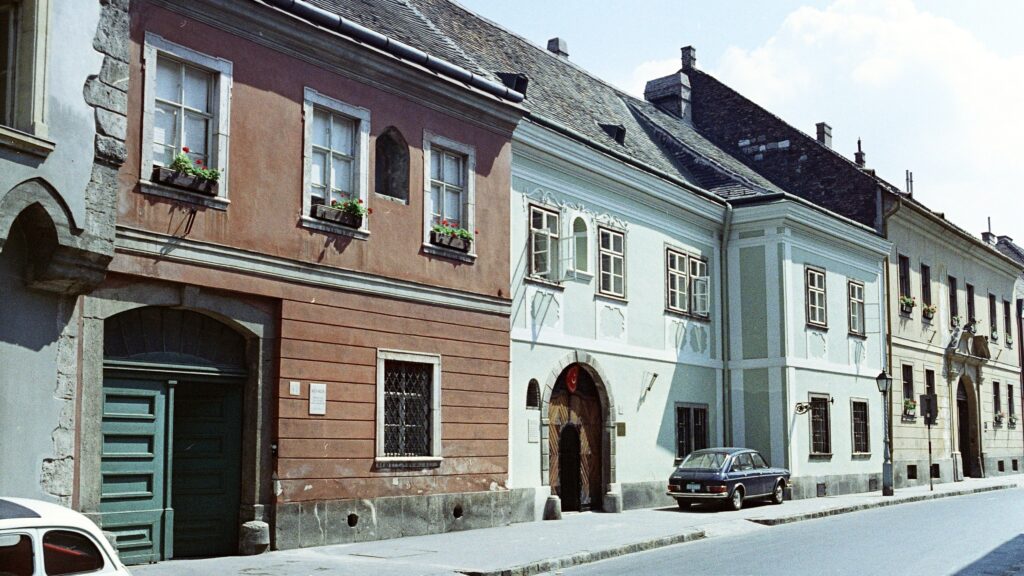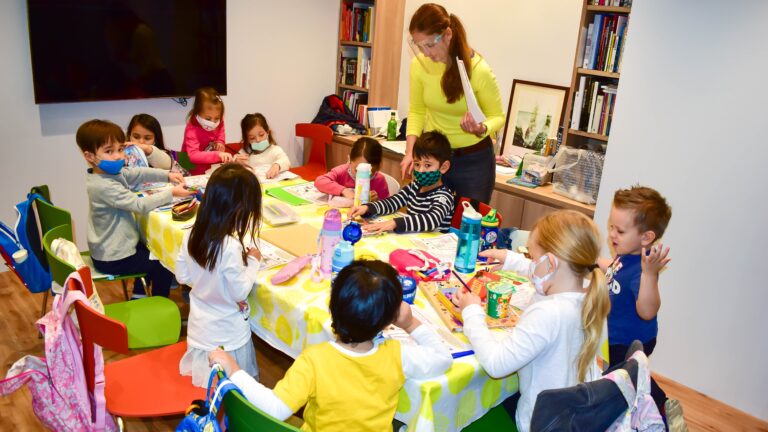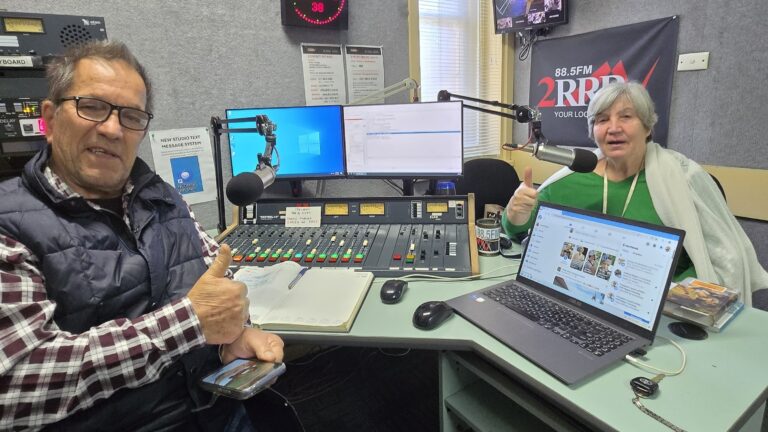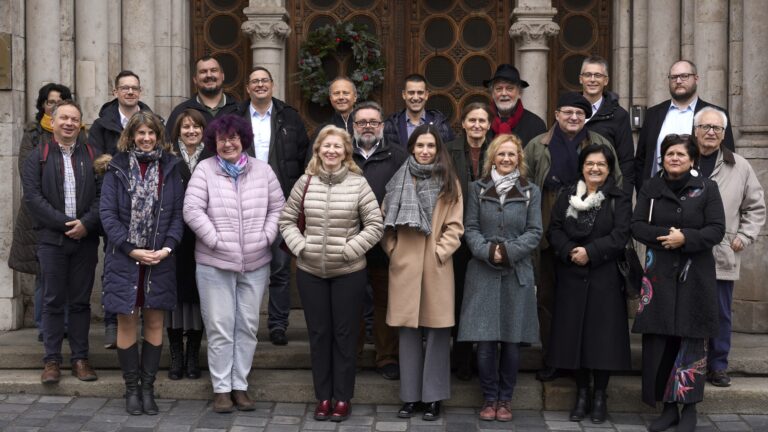Réka Sundem, the youngest speaker at the Hungarian Association’s annual conference in Cleveland, spoke to Hungarian Conservative about her experience as a student enrolled in one of the Balassi Education Programs in Hungary. Beyond the details of her scholarship, we also asked the 18-year-old about her mixed, Hungarian–American background.
***
Your background and family were not mentioned in your presentation. Tell us about them.
My maternal great-grandparents immigrated from Budapest; my grandparents were born ‘on the road’ in Austria; my mother, Krisztina Nádas, was born in Chicago. Since my American father was in the military, we moved around a lot and all my siblings were born in different states. I was born in California, my sister in Georgia, where we lived for five years, and after my dad died, we moved to Cleveland. We’ve been living here for about 12 years. My mom’s partner is also American, so my life continues being half Hungarian, half American; we still speak both languages at home. With my mom, mostly Hungarian, but if her partner is present, obviously English. I have three brothers, the oldest is 24, and a sister who is 15.
How do you cultivate your Hungarian language, culture and identity?
Many of the Hungarian scouts have two Hungarian-speaking parents, but we speak much more English than Hungarian at home. For example, if it was about the American school, we would talk in English, but if it wasn’t about that, we would try to speak Hungarian. Often we would start speaking in English and my mother would reply in Hungarian, and she would do so until we realized that we should also speak in Hungarian. And there were times when she specifically asked us to speak in Hungarian.
I think that despite my mixed family background, my Hungarian was good enough because there are so many Hungarian programs here in Cleveland. We have Hungarian school on Mondays, Regös (traditional folk culture-focused) activities on Tuesdays, Hungarian scouting on Fridays; we also have performances and multi-day camps. That means that three or four times a week we have the opportunity to speak Hungarian outside the family. If these opportunities did not exist, I would definitely not speak Hungarian like I do. Of course, using the language at home is not to be neglected either, and it is very important, but it would not have been enough for us, even though our father was supportive in this respect. My brothers and sisters all went to Hungarian school and Hungarian scouting. The only thing that was not compulsory for us was the Regös group, that was our choice, but since this was also a good community, we all but one of my brothers signed up for it. I did not only participate because I wanted to learn Hungarian folk dances and more about Hungarian culture, but also because I had Hungarian scout friends there.
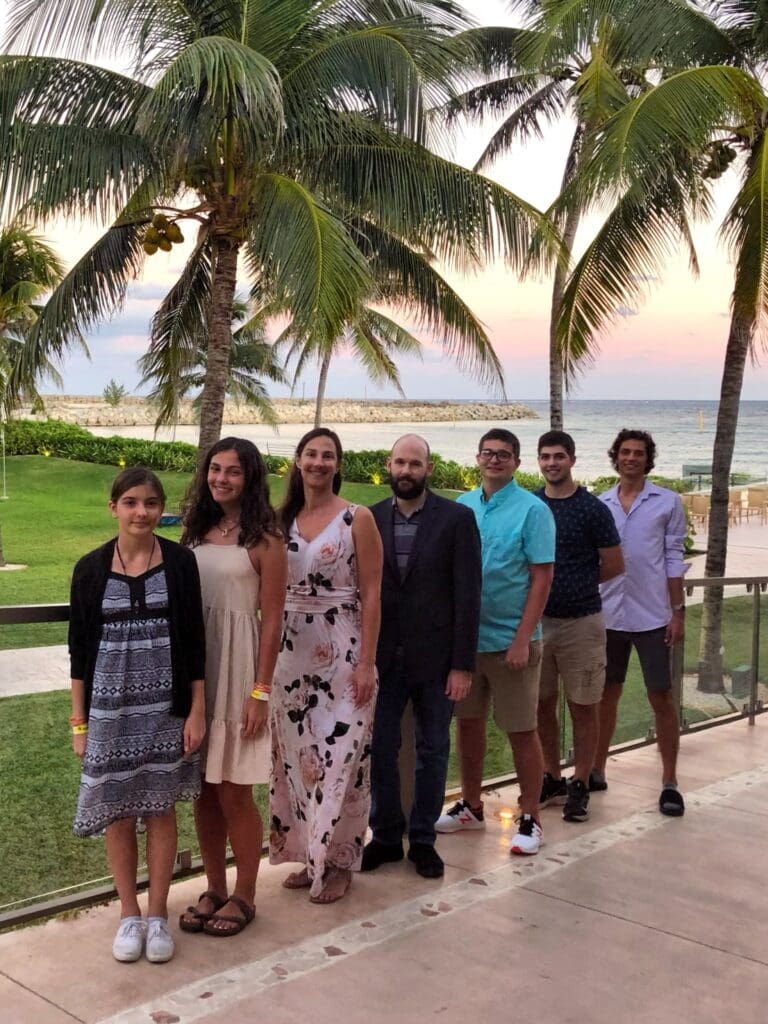
But you were the only member of the family to apply for the Balassi scholarship, which is a full-year program in Hungary.
Yes, even though I had planned to start university studies right after high school. Living abroad for a year was not part of my plans at all, but at the suggestion of a friend who was studying in Boston, I finally decided that it was more important to go to Hungary now and expand my vocabulary and learn about Hungarian culture, because during the Covid pandemic my language skills were weakening as we were unable to be part of the life of the community. I also knew that once I was in Europe, I could travel to other countries. Obviously the most important factor of my decision was learning Hungarian. When I arrived in Hungary, I felt like I was behind, and had a lot of catching up to do. Whenever I spoke with or in front of my teachers, I always felt I was speaking incorrectly. I am aware that even now I still make mistakes when speaking or writing. So it was quite difficult at the beginning, even though many of the participants did not even know Hungarian that well; some of them did not speak it at all.
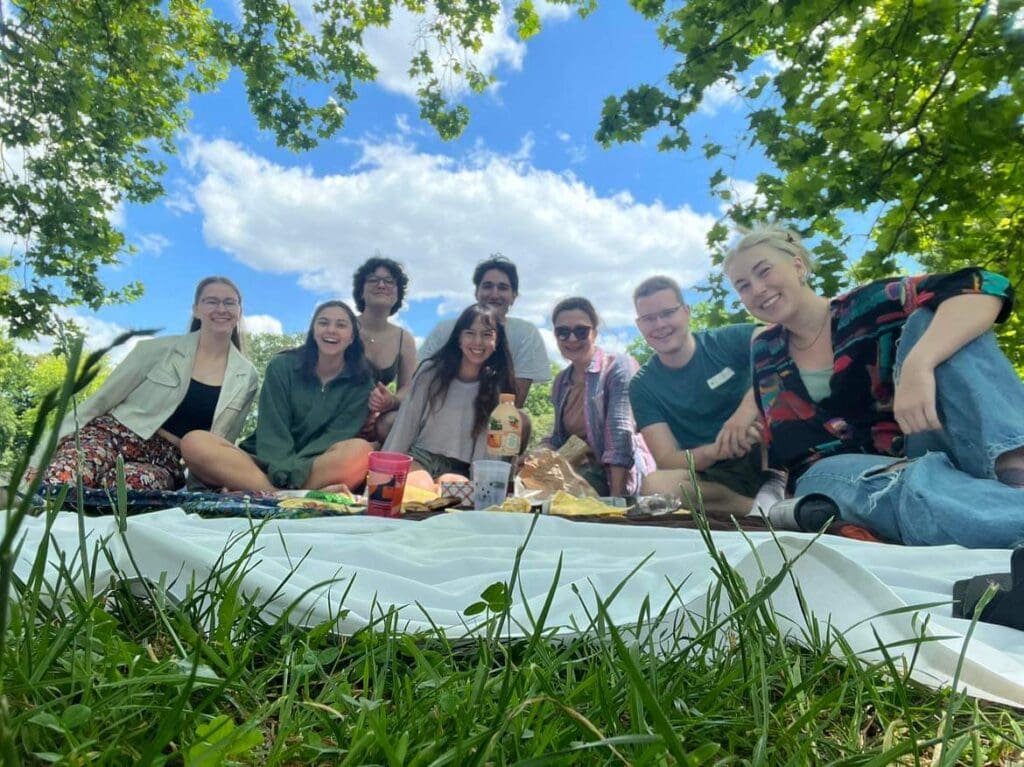
Have you been to Hungary before?
Yes, several times. My mother has a good friend there whom she met when we lived in California; her husband was also in the military. Whenever we went to Hungary for two or three weeks, we always stayed at their place so my mom could spend more time with her. Almost all of our Hungarian relatives moved to America over time, only one or two distant relatives live in Hungary. However, a few years ago one of my American uncles married a Hungarian woman and they live there now, which was very good for me because it allowed me to get to know them and their young children better, since previously, during the Covid pandemic, we could not meet. This summer I was part of the three-week Carpathian Basin tour of the Regös group with my sister, but five years ago only my mom and two oldest brothers accompanied them, while my third brother, my sister and I were at a horseback riding camp. During another summer, my siblings and I took part in a sailing camp, while my mom was at a dance camp. So I had already participated at Hungarian programs, immersed myself in Hungarian culture, and felt that Hungary was my home. But at the same time, I felt like a tourist for the first few months, because I wanted to see everything. I did not know Budapest that well before. I also had to learn how to use public transport.
What was your most memorable experience from this year?
I think it was a great, life-changing experience, because we had a fantastic group and really cool activities. My friend from Boston became my roommate, but I got to know all of the 40 or so participants. I have kept in touch with them since then. A Spanish girl became one of my best friends. I was in the Hungarian language and culture program, but there were other kinds of courses, and there were about 200 of us living in the same hotel, so I met a lot of new people. Out of 40, the better Hungarian speakers were about 18-22 years old and most of them were scouts, those with more modest Hungarian skills were typically a bit older, about 18-35 years old.
The excursions will certainly remain an eternal memory. In the fall we were in and around Eger, and in the spring we visited Transylvania, around Torockó, where we got to closely experience traditional rural lifestyle. We also went to the Bugaci puszta for a whole day, listening to lectures and we also went to a wine tasting event. And during our lessons, we went to the Palace of Arts, the Ludwig Museum and once they took us to the theatre, too.
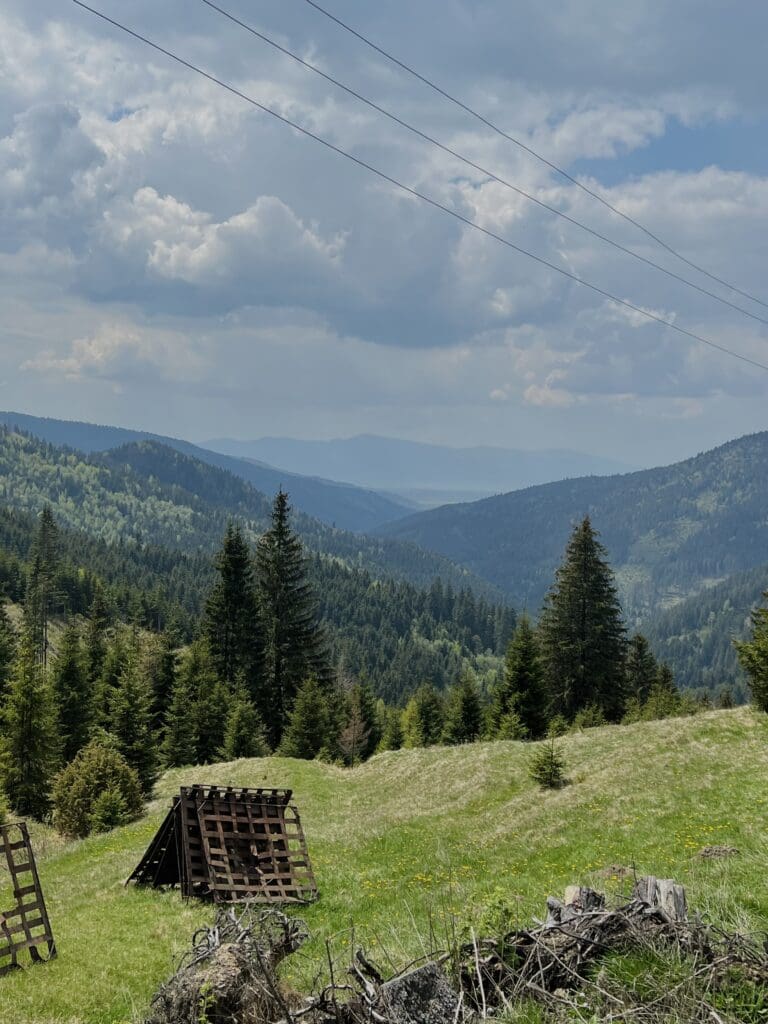
You said you were most proud of your final thesis. Why?
I wrote a twenty-four page essay in Hungarian, but not only the writing, but the whole research was also completed in Hungarian. I had to read and fully understand books in Hungarian, and how I wanted to include the relevant content in my thesis. This meant a whole year’s work: the topic had to be chosen by November, a draft outline produced by the end of the year, research was underway at the beginning of the year, the thesis had to be put in writing by May and defended by the end of June. My mentor was very helpful. The topic of my thesis was Matyó embroidery and I chose it because we had previously had a scouting program where we did embroidery. Each group was given a motif from a different region; I was given a Matyó rose to embroider. I really liked it, but I did not know anything about who the Matyós were, where they lived, why they embroidered such patterns, why they used such colours etc., so I started to get interested. That is how it started.
And what did you miss in the program?
The contact with regular Hungarian students should have been a bit closer, because we did not have the opportunity to meet locals. There were a lot of programs where foreigners met each other, but there were no programs or other opportunities to meet local Hungarians of our age, which I think would be very important and should be included in the program somehow. It would be useful to get to know them too, especially for those—and there are quite a few of them—who are contemplating on further plans in Hungary, like myself. The other is that there is no formal alumni program organized. I know that in the diaspora there are programs organized for various alumni, but not officially by the Balassi Institute. Finally, we could have been given more exposure to contemporary culture as well as popular culture. The museums were very interesting, I would have liked to go to more, as well as to galleries, theatres and cinemas.
What cultural differences did you have to get used to at the beginning?
In American shopping malls you find everything in one place, while in Budapest I had to go to separate stores a lot. I also had to get used to public transport because I drove everywhere in Cleveland. I do not have a car in Boston either, I use public transport there, but it is not as good as in Budapest. And I had to get used to the education model itself. We stayed in the same classroom and the teachers rotated, which is the other way around in America, and I also had to get used to learning in a small study group. There were only seven or eight of us in a class. I used to be in classes of 20-30 in the United States and if I did not want to answer a question from the teacher, I just simply did not look at her and it did not really matter, because there was always someone else who was willing to answer. But in our Hungarian study group we always had to say something regardless of whether or not you wanted to. I was also able to develop a much closer relationship with the teachers, which was good overall, just a bit unusual in comparison with my previous experience.
What did you do with what you learned during the program after you returned home? What are your plans for Hungary?
I do not know yet, but at the end of the school year I wanted to show the people here in Cleveland what I had covered in my final thesis. I had gathered so much knowledge about Matyó embroidery that I wanted to present it to the scouts, because I did not know much about it before. However, now I am so busy with my university studies that I do not have time for scouting at all. However, since I came back I have told others about the Balassi Institute, and I know some friends who want to apply for the program; it is worth promoting it that way. As for my plans for Hungary, I do not have any concrete plans yet, I just had such a good time there that I would like to go back, but I do not know when and how.

